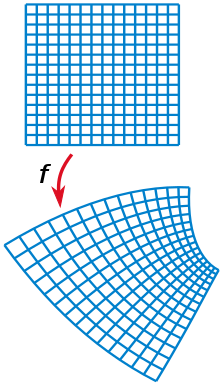Conformal field theory
Conformal field theories ( English Conformal Field Theory , abbreviation CFT ) are quantum field theories or statistical field theories that are invariant under any conformal transformations . Most renormalizable field theories fall into this category at their critical points , because the system has scale invariance there (described by the renormalization group ), see also Figure 1.

The group of conformal transformations of the 2-dimensional Euclidean space is generated by an infinite-dimensional algebra of generators . This high degree of symmetry enables a classification of 2-dimensional field theories and sometimes an exact solution. For this reason, the critical exponents of 2-dimensional systems are often rational numbers (examples: Ising model , isotropic percolation ).
Other applications are found in the string theory , as a string in spacetime spans a two-dimensional surface.
For d- dimensional Euclidean spaces with d> 2, however , the algebra of the generators is only (d + 1) (d + 2) / 2 -dimensional, and the conformal invariance is less useful here.
See also
literature
- Malte Henkel: Conformal invariance and critical phenomena. Springer, Berlin a. a. 1999, ISBN 3-540-65321-X ( Texts and Monographs in Physics ).
- John Cardy : Scaling and Renormalization in Statistical Physics. Cambridge University Press, Cambridge u. a. 1996, ISBN 0-521-49959-3 ( Cambridge Lecture Notes in Physics 5).
Web links
- Strings and Branen Worlds: Some Aspects of a Unified Theory of All Interactions . Max Planck Society, 2005
- Michael Flohr: Conformal field theory and Riemann surfaces . (PDF; 1.77 MB) Leibniz University Hannover; Slideshow
- Matthias R. Gaberdiel: Conformal Field Theory (PDF; 504 kB) Lecture notes, ETH Zurich
- Paul Ginsparg: Applied Conformal Field Theory , Lectures given at Les Houches summer session 1988 arxiv : hep-th / 9108028